‘There’s a weight on my chest’: Supernova survivors return to site of Hamas massacre
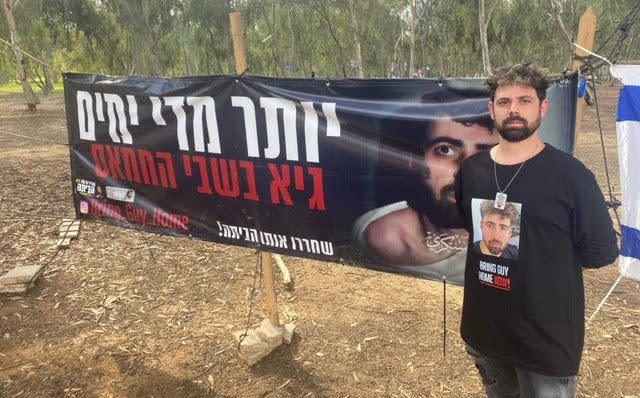
In the dappled sunlight, Gal Dalal steps across the uneven ground where his brother was kidnapped by Hamas gunmen. He crouches underneath a rope slung between the trees before standing upright next to a campaign poster of his sibling, bearing the words, “Too many days in Hamas captivity - release him home!”
It’s been three months since Gal, 29, fled Hamas when they overran the Supernova music festival site next to kibbutz Re’im. As he returns to the site for the first time, the air is warm and filled with the smell of eucalyptus and greenery. But there is an unavoidable heaviness here too.
“When I came here today, it was like there was a weight on my chest,” he told The Telegraph. “I can feel what happened here. I did not think that I would feel it so physically, but I do.”
Gal, from the town of Herzliya, managed to escape Hamas’ Oct 7 rampage, running for eight hours before Israeli security forces found him. But his 22-year-old brother Guy was taken into Gaza, around five kilometres away.
The grass has grown and wildflowers have spread among the silver-barked trees at the Supernova site, where militants killed 364 people and took another 140 hostage, including Guy.
Since then, the bodies of those murdered, the burnt-out cars of people who tried to flee and the debris of the ransacked festival have been removed from the area. Memorials have sprung up in their place. In a clearing, families of the victims have created small shrines: candles in tins and plastic fizzy drink bottles, white stones, and olive branches.
War is not far away. The Israel Defense Forces is bombarding Gaza from positions nearby and artillery fire booms through the air every minute or so. Drones buzz overhead.
Gal wants to retrace the steps he took to flee this place - to see how it will feel to walk again on the path that took him to safety. But he does not know where it was.
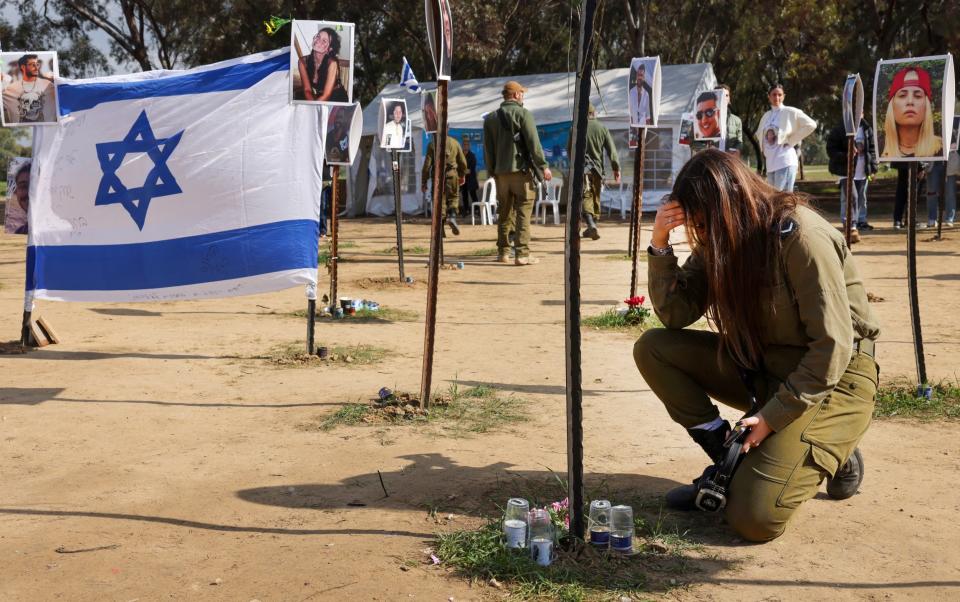
“It’s here somewhere, I’m not really sure because this place seems different,” he said, wearing a black T-shirt bearing a photo of his brother. He looks around and squints in the sunshine, trying to get his bearings.
“I think it was there - there is a valley where you can go down to a lower level,” Gal continued, pointing towards a patch of green dotted with fruit trees. “I think it was there. I also want to see how this place looks now because I know it changed a little bit because of the green. It was burnt, and then it regrew.”
Gal is not alone in returning to the festival site. Standing calmly in front of journalists at the site of his kidnap, Itay Regev recounts how he was taken from the music festival with his sister Maya and friends. At least one of them remains captive in Gaza.
“It was very important for me to be here today and share it from the bottom of my heart,” said 18-year-old Regev, who was released alongside his sister during a week-long Gaza ceasefire in late November.
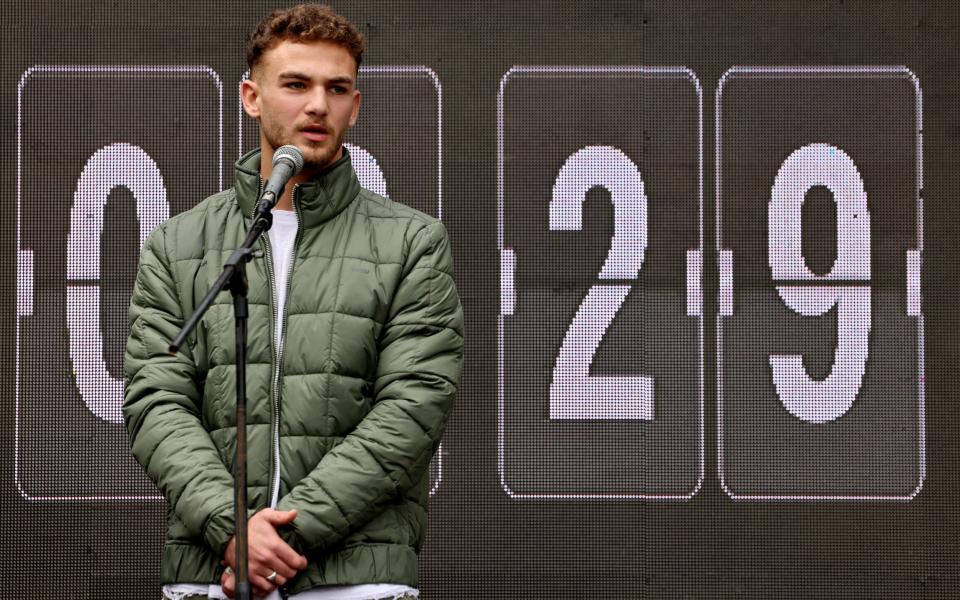
“I was in captivity for 54 days and every day there is like forever,” he continued.
“The conditions there are very, very hard to survive. The hostages cannot stay there for one more second. They all have to return home now.”
There are 136 people still being held captive by Palestinian factions in Gaza and their families are determined that they return home alive.
Some of the relatives of hostages taken from the festival site had never been to Re’im before. But they decided to visit as part of efforts to remind the world of their loved ones’ fates - and to come to terms with what happened.
Yarden Gonen, 30, a nurse by profession, sits between the trees on a white plastic lawn chair and tries to light a hand-rolled cigarette. Her sister Romi, 23, was shot and then kidnapped from the site on Oct 7.
She had wanted to come in the first weeks after the massacre but hesitated.
“I wanted to come - but I don’t know why I didn’t do it until now,” she told The Telegraph pensively, seeming to shrink inside her mustard yellow coat. “I think I was a bit afraid because it’s so beautiful, and you cannot understand how something so horrible happened here.”
How does she feel, seeing the place where her sister was taken? “It feels confusing to be here,” she said, struggling to light her cigarette against the light breeze. “I am happy to be here to see here, to see where this took place, but […] I had flashbacks as if I had been there.”
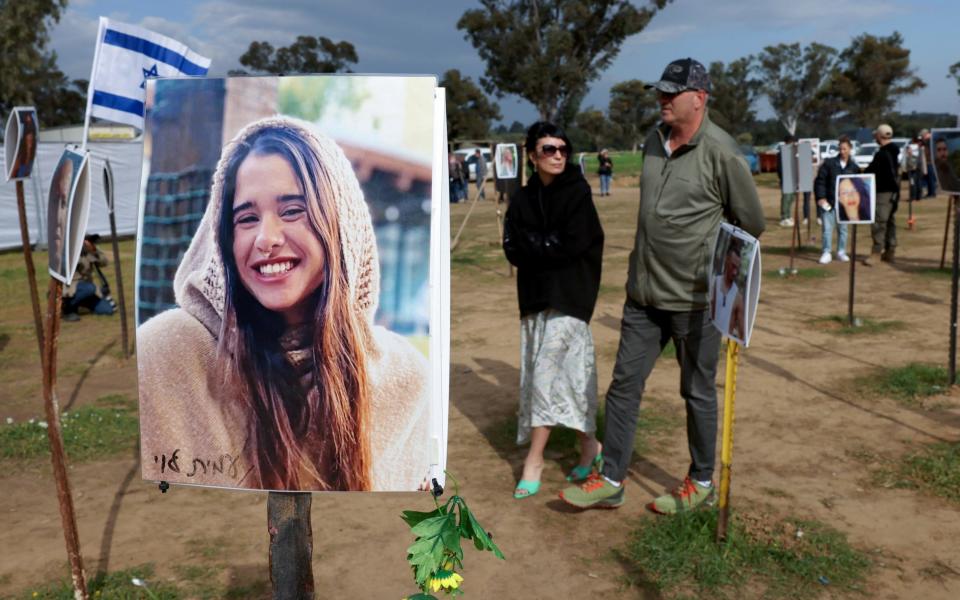
If she had the opportunity to speak to her sister’s captors, what would she say?
“I would ask them, ‘Why?’ What did my sister do to you? She did not do anything wrong.’”
Amit Shem Tov, 24, from Tel Aviv, had never been to the Nova festival site before. But his 21-year-old brother Omer’s kidnap has prompted him to swap his job as a coffee barista for days of campaigning.
“It gives you the shivers,” he said, of coming to the festival site, looking around him at the tall trees and people milling around the memorials. “It’s really hard to take it in.”
The smack and bang of outgoing fire into Gaza continues in the background, and smoke later rises on the horizon. It’s a reminder of the proximity of the ongoing Israeli war against Hamas in the Palestinian enclave, where the civilian death toll is rising and tens of thousands of people have been injured.
Amit wants his brother home. He also wants as few people killed as possible in the ongoing operations.
“I hope that we are going to resolve this in the most peaceful way and that we can spare the casualties on both sides,” he said.
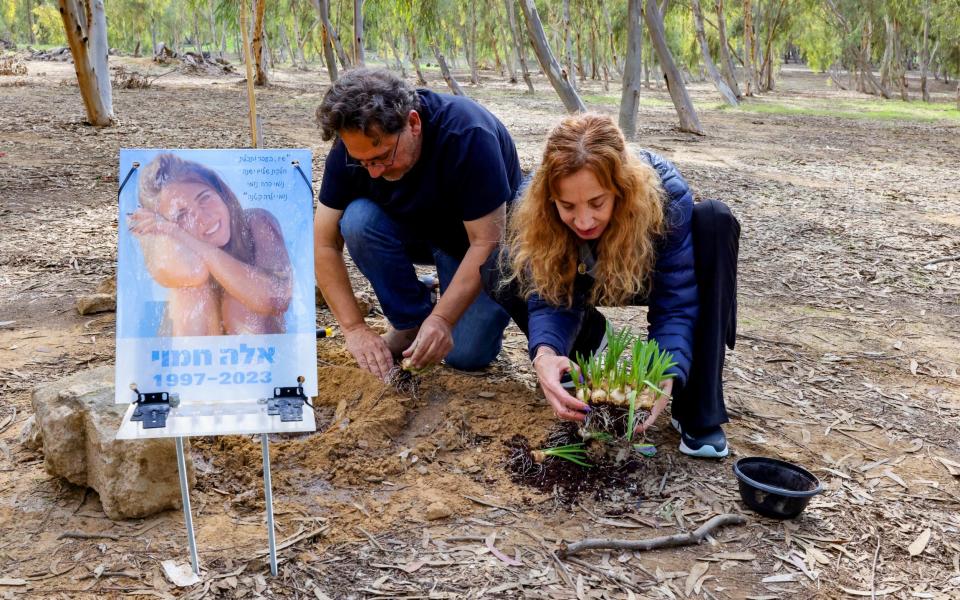
The families of hostages want a plan from the Israeli government for the return of their loved ones, and also greater international pressure on Hamas via countries with influence.
“We are asking President Biden to ask Qatar to put pressure on Hamas to release the hostages,” said Asaf Pozniak, whose relatives Hodaya and Tair David were killed by militants at the Supernova site. Qatar hosts Hamas’ political wing and was instrumental in the deal that saw 100 hostages, including Itay Regev, released at the end of last year.
As the day continues, more people start to arrive at the site to pay their respects to the people killed there. Riding in on unpaved roads using buses and desert buggies, they gather alongside the small memorials, reading the lists of the names. An Israeli reservist soldier usually deployed in the north translates a Hebrew poem on a sign hammered into raw soil. “There are flowers whose melody is endless.”
For survivors and families of the hostages, it is hard to move on from this place.
‘It’s been three months,” said Gal. “Things change. Time passes. But it’s like I’m stuck on the same day, October 7.”

